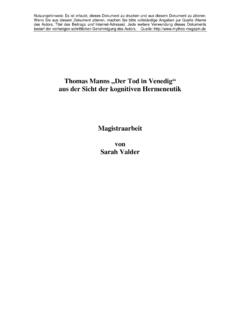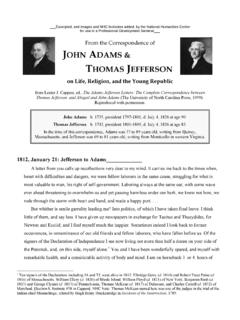Transcription of Thomas Mann - MARIO AND THE MAGICIAN
1 Thomas mann MARIO AND THE MAGICIAN The atmosphere of Torre di Venere remains unpleasant in the memory. From the first moment the air of the place made us uneasy, we felt irritable, on edge; then at the end came the shocking business of Cipolla, that dreadful being who seemed to incorporate, in so fateful and so humanly impressive a way, all the peculiar evilness of the situation as a whole. Looking back, we had the feeling that the horrible end of the affair had been preordained and lay in the nature of things; that the children had to be present at it was an added impropriety, due to the false colours in which the weird creature presented himself. Luckily for them, they did not know where the comedy left off and the tragedy began; and we let them remain in their happy belief that the whole thing had been a play up till the end. Torre di Venere lies some fifteen kilometres from Portoclemente, one of the most popular summer resorts on the Tyrrhenian Sea.
2 Portoclemente is urban and elegant and full to overflowing for months on end. Its gay and busy main street of shops and hotels runs down to a wide sandy beach covered with tents and pennanted sand-castles and sunburnt humanity, where at all times a lively social bustle reigns, and much noise. But this same spacious and inviting fine-sanded beach, this same border of pine grove and near, presiding mountains, continues all the way along the coast. No wonder then that some competition of a quiet kind should have sprung up further on. Torre di Venerethe tower that gave the town its name is gone long since, one looks for it in vain-is an offshoot of the larger resort, and for some years remained an idyll for the few, a refuge for more unworldly spirits. But the usual history of such places repeated itself: peace has had to retire further along the coast, to Marina Petriera and dear knows where else. We all know how the world at once seeks peace and puts her to flight-rushing upon her in the fond idea that they two will wed, and where she is, there it can be at home.
3 It will even set up its Vanity Fair in a spot and be capable of thinking that peace is still by its side. Thus Torrethough its atmosphere so far is more modest and contemplative than that of Portoclemente-has been quite taken up, by both Italians and foreigners. It is no longer the thing to go to Portoclemente-though still so much the thing that it is as noisy and crowded as ever. One goes next door, so to speak: to Torre. So much more refined, even, and cheaper to boot. And the attractiveness of these qualities persists, though the qualities themselves long ago ceased to be evident. Torre has got a Grand Hotel. Numerous pensions have sprung up, some modest, some pretentious. The people who own or rent the villas and pinetas overlooking the sea no longer have it all their own way on the beach. In July and August it looks just like the beach at Portoclemente: it swarms with a screaming, squabbling, merrymaking crowd, and the sun, blazing down like mad, peels the skin off their necks.
4 Garish little flat-bottomed boats rock on the glittering blue, manned by children, whose mothers hover afar and fill the air with anxious cries of Nino! and Sandro! and Bice! and Maria! Pedlars step across the legs of recumbent sun-bathers, selling flowers and corals, oysters, lemonade, and cornetti al burro, and crying their wares in the breathy, full-throated southern voice. Such was the scene that greeted our arrival in Torre: pleasant enough, but after all, we thought, we had come too soon. It was the middle of August, the Italian season was still at its height, scarcely the moment for strangers to learn to love the special charms of the place. What an afternoon crowd in the caf s on the front! For instance, in the Esquisito, where we sometimes sat and were served by MARIO , that very MARIO of whom I shall have presently to tell. It is well-nigh impossible to find a table; and the various orchestras contend together in the midst of one's conversation with bewildering effect.
5 Of course, it is in the afternoon that people come over from Portoclemente. The excursion is a favourite one for the restless denizens of that pleasure resort, and a Fiat motor-bus plies to and fro, coating inch-thick with dust the oleander and laurel hedges along the highroad-a notable if repulsive sight. Yes, decidedly one should go to Torre in September, when the great public has left. Or else in May, before the water is warm enough to tempt the Southerner to bathe. Even in the before and after seasons Torre is not empty, but life is less national and more subdued. English, French, and German prevail under the tent-awnings and in the pension dining-rooms; whereas in August-in the Grand Hotel, at least, where, in default of private addresses, we had engaged rooms-the stranger finds the field so occupied by Florentine and Roman society that he feels quite isolated and even temporarily d class . We had, rather to our annoyance, this experience on the evening we arrived, when we went in to dinner and were shown to our table by the waiter in charge.
6 As a table, it had nothing against it, save that we had already fixed our eyes upon those on the veranda beyond, built out over the water, where little red-shaded lamps glowed-and there were still some tables empty, though it was as full as the dining-room within. The children went into raptures at the festive sight, and without more ado we announced our intention to take our meals by preference in the veranda. Our words, it appeared, were prompted by ignorance; for we were informed, with somewhat embarrassed politeness, that the cosy nook outside was reserved for the clients of the hotel: ai nostri clienti. Their clients? But we were their clients. We were not tourists or trippers, but boarders for a stay of some three or four weeks. However, we forbore to press for an explanation of the difference between the likes of us and that clientele to whom it was vouchsafed to eat out there in the glow of the red lamps, and took our dinner by the prosaic common light of the dining-room chandelier-a thoroughly ordinary and monotonous hotel bill of fare, be it said.
7 In Pensione Eleonora, a few steps landward, the table, as we were to discover, was much better. And thither it was that we moved, three or four days later, before we had had time to settle in properly at the Grand Hotel. Not on account of the veranda and the lamps. The children, straightway on the best of terms with waiters and pages, absorbed in the joys of life on the beach, promptly forgot those colourful seductions. But now there arose, between ourselves and the veranda clientele-or perhaps more correctly with the compliant management-one of those little unpleasantnesses which can quite spoil the pleasure of a holiday. Among the guests were some high Roman aristocracy, a Principe X and his family. These grand folk occupied rooms close to our own, and the Principessa, a great and a passionately maternal lady, was thrown into a panic by the vestiges of a whooping-cough which our little ones had lately got over, but which now and then still faintly troubled the unshatterable slumbers of our youngest-born.
8 The nature of this illness is not clear, leaving some play for the imagination. So we took no offence at our elegant neighbour for clinging to the widely held view that whooping-cough is acoustically contagious and quite simply fearing lest her children yield to the bad example set by ours. In the fullness of her feminine self-confidence she protested to the management, which then, in the person of the proverbial frock-coated manager, hastened to represent to us, with many expressions of regret, that under the circumstances they were obliged to transfer us to the annexe. We did our best to assure him that the disease was in its very last stages, that it was actually over, and presented no danger of infection to anybody. All that we gained was permission to bring the case before the hotel physician-not one chosen by us-by whose verdict we must then abide. We agreed, convinced that thus we should at once pacify the Princess and escape the trouble of moving.
9 The doctor appeared, and behaved like a faithful and honest servant of science. He examined the child and gave his opinion: the disease was quite over, no danger of contagion was present. We drew a long breath and considered the incident closed-until the manager announced that despite the doctor's verdict it would still be necessary for us to give up our rooms and retire to the d pendance. Byzantinism like this outraged us. It is not likely that the Principessa was responsible for the wilful breach of faith. Very likely the fawning management had not even dared to tell her what the physician said. Anyhow, we made it clear to his understanding that we preferred to leave the hotel altogether and at once-and packed our trunks. We could do so with a light heart, having already set up casual friendly relations with Casa Eleonora. We had noticed its pleasant exterior and formed the acquaintance of its proprietor, Signora Angiolieri, and her husband: she slender and black-haired, Tuscan in type, probably at the beginning of the thirties, with the dead ivory complexion of the southern woman, he quiet and bald and carefully dressed.
10 They owned a larger establishment in Florence and presided only in summer and early autumn over the branch in Torre di Venere. But earlier, before her marriage, our new landlady had been companion, fellow-traveller, wardrobe mistress, yes, friend, of Eleonora Duse and manifestly regarded that period as the ckwn of her career. Even at our first visit she spoke of it with animation. Numerous photographs of the great actress, with affectionate inscriptions, were displayed about the drawing-room, and other souvenirs of their life together adorned the little tables and tag re. This cult of a so interesting past was calculated, of course, to heighten the advantages of the signora's present business. Nevertheless our pleasure and interest were quite genuine as we were conducted through the house by its owner and listened to her sonorous and staccato Tuscan voice relating anecdotes of that immortal mistress, depicting her suffering saintliness, her genius, her profound delicacy of feeling.












